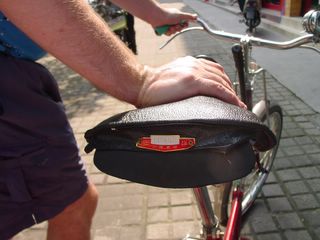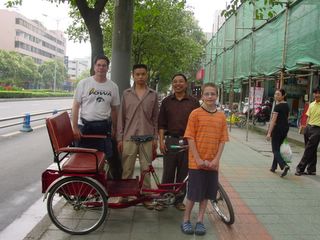Contact: Sue Cline: Volunteer : Katrinalist.net : Communications & Media Phone: (804) 230-3456
Contact: Marty Kearns: Volunteer : Katrinalist.net : Communications & Media (C ) 202-487-1887
Contact: Zack Rosen: Volunteer : Katrinalist.net : Technical and Engineering Lead (C) (724)612-7641
WASHINGTON, Friday, September 09, 2005 — The largest collection of data on the web about evacuees and survivors has been pulled together by volunteers and programmers working long hours for the last week. The http://www.katrinalist.net is a collection of survivor information from across dozens of sites. The project was launched to provide information on survivors to family and friends across the web. The http://www.katrinalist.net site forms a needed complement to a pending launch of newer efforts to organize data by the Red Cross, FEMA and the Department of Homeland Security.
The "official sites" will be focusing on new more structured data collected from people in shelters and from those interacting with government programs and relief organizations. http://www.Katrinalist.net is the complement to whatever official collection all the informal data from bulletin boards, discussion forms and sites across the web. Katrinalist.net will provide data to Katrinasafe.com (also know at this blog as the jagoffs.)
Those seeking information on family should first search www.katrinasafe.com and then www.katrinalist.net. These sites represent the best collection of data and the best hope for helping family and friends locate each other.
Evacuees wishing to inform loved ones of their location can register or post information about survivors at http://www.katrinasafe.com/WebEntryApplication/entryform.aspx
Report a Missing Person at http://www.katrinasafe.com/WebEntryApplication/InquiryEntryForm.aspx
These are all voluntary and self-reporting tools. All media outlets and those hosting discussion boards, search tools and other information on survivors or offering connections to families are asked to redirect search traffic and data input to these sites.
Additional Background:
The project was launched as the core team started to realize that too many sites were collecting data and stories on families looking for or posting the status of their friends and neighbors. In the moments leading up to the storm dozens of sites launched services to help their members, including: New Orleans Newspapers (NOLA.com), TV and radio sites, Craigslist, CNN, MSNBC, Yahoo, Blogs and the Red Cross. In the hours following the storm companies, college students and volunteers began to set up databases for people to add and search information.
On Friday the 9th, The American Red Cross, with support of the International Red Cross and Red Crescent Movement launched a web site and hotline to help assist family members who are seeking news about loved ones living in the path of Hurricane Katrina.
Dozens of message boards have sprung up around the country since Hurricane Katrina devastated the Gulf Coast, promising to throw a technological lifeline to families that have been ripped apart. At the same time, the proliferation of registries has also made it increasingly difficult to figure out where to find information on missing loved ones.
"If I'm a refugee trying to find my brother, I would have to search 20 databases and 25 online forums," said David Geilhufe, chief executive of the Social Source Foundation, a charity set up to create software for other non-profits. "It's a huge problem."
Enter Katrinalist.net. The all volunteer team created a searchable directory of persons displaced or affected by Hurricane Katrina, consolidating over 25 different online resources into one central, searchable repository. PeopleFinder Interchange Format, (called 'PFIF') is a new, standardized data format implemented in XML.
Katrina People Finder (www.katrinalist.net) helps in the organization of data about people affected by major storms such as Hurricane Katrina and speeds searches by allowing many organizations to contribute to a central repository. The interchange format of Katrina People Finder makes automated search and retrieval of data about people quick and easy. Common data will help automated systems to connect displaced individuals via automatic categorization and matching.
The Kartinalist.net PeopleFinder database now contains just barebones information -- such as name, phone number, last known address and status. But Dean Robison of Salesforce.com, a San Francisco software firm that is providing the technology to run the consolidated database, said it could easily be expanded in the future to speed rescue and relief operations in further disasters.
The Power of Community
The Katrina PeopleFinder Project mobilized hundreds of volunteers over the Labor Day weekend to make an immediate difference. That immediate difference is at http://www.katrinalist.net/, a searchable database of almost 400,000 PeopleFinder Interchange Format-compliant, volunteer-entered, missing and found persons reports from across the web. Having a single, searchable resource is critical due to limited internet access for evacuees and their families. The team plans to turn its attention to housing and job solutions next, creating a centralized technology solution that aggregates a comprehensive resource set from sites all across the web, standardizes them, and makes them searchable from anywhere.
Project Contributors
CivicSpace Labs (http://www.CivicSpaceLabs.org) is a funded non-profit organization and community collaborating with the Drupal (http://www.Drupal.org) project to develop a free/open-source software platform for online community organizing. CivicSpace enables bottom-up people-powered campaigns to operate on a more level playing field with more traditional top-down organizations, and, similarly, allows top-down organizations to leverage the power of grassroots organizing.
Salesforce.com Foundation (http://www.salesforcefoundation.org/index.html) was officially launched in July 2000 by Secretary of State, Colin L. Powell. The launch of the Foundation came less than a year after the launch of the company with the goal of building philanthropic programs at the very beginning of the company's existence rather than waiting until the company had reached a certain level of 'comfortable success'. Our belief is if emphasis is placed on social programs from a company's inception, the value of service will be a core cultural value that is built into the fabric of the company.
Social Source Software (http://www.social-source.com/) creates world-class software specifically for nonprofit and non-governmental organizations, usually under an open source license. Social Source Software works with organizations seeking to create enterprise grade websites, web applications, and other types of software.
Craigslist (http://www.Craigslist.org) From its humble beginnings as an e-mail newsletter sent to friends in San Francisco, Craigslist has grown to be one of the largest online community bulletin boards, with 175 Craigslist sites in all 50 US states, and 34 countries. Craigslist was one of the earliest community sites to coordinate hurricane relief, rescue and reunion for Katrina survivors.




















